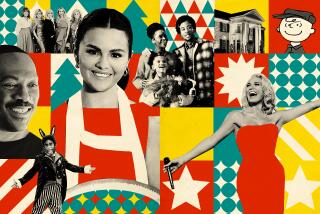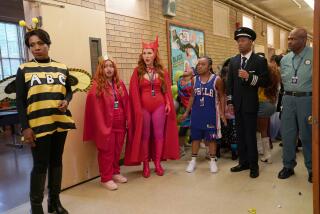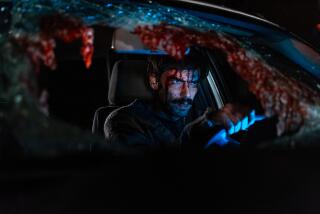TV Picks: ‘Toy Story of Terror,’ ‘56 Up,’ ‘Reign,’ ‘Burton & Taylor’
“Toy Story of Terror” (ABC, Wednesday). And so the three-headed holiday season begins, with a Halloween special wrought from the “Toy Story” franchise -- a franchise, it hurts my brain to realize, that is nearly 20 years old. No expense, horses or gigabytes have been spared for its being merely a TV show. (I do assume all the relevant codes reside on a supercomputer somewhere, waiting to bring these characters economically back to life.) Tom and Tim and Joan and Don and Wally and Timothy and Kristen (Hanks, Allen, Cusack, Rickles, Shawn, Dalton and Schaal, that is) are back as Woody and Buzz and Jessie and Potato Head and Rex and Pricklepants and Trixie, with new-to-the series Pez Cat (Kate McKinnen), Pocketeer (Ken Marino) and Combat Carl (Carl Weathers), whose specs are contained in his name. (It’s a name you will hear a lot, as he refers to himself in the third person) It begins in the classic way: a road trip -- Woody and the gang are along for the ride -- a rainy night, a flat tire, an unexpected stop. (“A roadside motel is one of the most common locales for a horror film,” says pedantic stuffed hedgehog Pricklepants, who keeps up a meta-commentary throughout, in the manner of “Scream.”) Stephen Tobolowsky plays the desk clerk; did a chill just run down your spine? When Mr. Potato Head -- foolish plastic potato! -- leaves the safety of a motel closet to check out the “amenities” in the dead of night, he kick-starts a genre-familiar sequence of separation and disappearance and things moving about in the dark. (Themes from earlier “Toy Story” movies are also recycled, which should bother no one.) Although Woody and Buzz get their screen time -- with Jessie, they are the “Jules et Jim” of computer-animated cartoons about sentient playthings -- it is the plucky cowgirl, facing her fears, whose story this is.
FALL TV 2013: Watch the trailers
“56 Up” (PBS, Monday). Michael Apted’s great, growing lifelong documentary project reaches late middle age. The series began (with a different director) in 1964 -- this franchise is more than twice as old as “Toy Story” -- to provide a “glimpse of Britain’s future” as nascently embodied by 14 7-year-olds from different economic and cultural backgrounds; in its premise was the suggestion that the future had already been largely written. But the subsequent films (all directed by Apted and made for television, though sometimes released theatrically here), which return to the same subjects after seven-year intervals, argue that life is not that predictable, apart from the fact that we all get older (if at seemingly different rates of decay), if we live. They have become something bigger, grander, more universal. What we find in this latest episode, despite ups and downs, divorces and deaths and disease, is a great deal of contentment, and, barring contentment, acceptance, and barring acceptance, understanding -- the recompense age gives for taking away all that beautiful youth. (Each new film incorporates material from its predecessors, and so we see the characters at several ages, the young and the old and the in-between compounded into one.) And the story has grown over the years, like stories do, as spouses and children and grandchildren have come into the picture and grown old or grown up -- the series contains its own echoes, like a human canon. And more and more “Up” itself has become its own subject, not only its effect on the lives of its participants, but where the participants feel it has wrongly or insufficiently represented them. (Some have gone and come over the years; all but one is present here.) Still, as one subject says, “It isn’t the picture, really, of the essence of Nick or Suzy -- it’s a picture of everyone. It’s how a person, any person, how they change.... It’s not an absolutely accurate picture of me but it’s a picture of somebody and that’s the value of it.” In other words, a picture of you.
PHOTOS: Leading ladies of the fall TV season
“Burton and Taylor” (BBC America, Wednesday). Wonderful performances, by Dominic West and Helena Bonham Carter as Richard Burton and Elizabeth Taylor, anchor this fine work of biographical re-creation and speculation. That there would be two biopics I’d like in a single year, given my problems with the form, surprises me; but, along with that Liberace movie, this disquisition on love and regret does things right. Set in 1983, on the occasion of the twice-married, twice-split couple’s last collaboration -- a revival of Noel Coward’s comedy “Private Lives” that echoed and exploited their own relationship -- it keeps the focus tight and, with small exceptions, does not make dramatic mountains out of everyday molehills. There isn’t much in the way of a plot, which is only a problem if you prefer your biographical dramas to resemble movies more than they do life; writer William Ivory has provided scenes with room to move around in, filling in a little history with reminiscence but not gumming up the talk with exposition. Director Richard Laxton (“An Englishman in New York”) maintains a thoughtful tone; cinematographer David Katznelson (“Downton Abbey”) and art director Ben Collins (“Zero Dark Thirty”) evoke the era without fetishizing it. The film’s keynote is affection -- affection for the principals and between them, which sets it apart from most such pictures right from the start. (There is tension as well, of course; not for nothing were they called the Battling Burtons.) If neither actor is quite worn enough for the part -- each is younger (Bonham Carter only slightly) and fitter than the person being played -- they sit comfortably inside them, hinting at their inimitable star power but, more important, creating the decent, troubled humans behind it. As with all the best fact-based dramas, it presents a workable theory of the actual lives -- It could have been like this -- even as you know the truth is something else, and unknowable.
FULL COVERAGE: Fall TV preview 2013
“Reign” (CW, Thursdays). Or Mary Queen of Scots, the High School Years. Any network series that begins with a title reading “France 1557” and does not lead straight to vampires or leap forward to present-day Manhattan, is going to be worth a look. (This being the supernatural CW, however -- “The Vampire Diaries” is its lead-in -- we do get a soothsayer, with Rossif Sutherland, Keifer’s half-brother, as Nostradamus, or as I think of him, Hot Nostradamus. Also some scary woods and possibly a ghost.) “You’re nearly a woman,” a mother superior tells a convent-departing Mary (Adelaide Kane), off to meet her French royal intended (Toby Regbo), “and Francis is nearly a man. It’s time.” And we’re off. Much intrigue and heavy breathing follows, and a soundtrack of Mumfordy Celtic folk-rock that is its musical equivalent. The pilot for this teenage historical bodice ripper is gorgeously shot, with an almost worshipful regard for the beauty of its players and everything they touch or that touches them. (The Paris fashions Mary and her besties-in-waiting wear would not look out of place on next week’s red carpet.) As elsewhere, British accents denote quality and make the kids sound sexy. Beheading -- Mary’s, anyway -- is far off, so you can rest easy on that account, at least, while disquiet colors all else.
More to Read
The complete guide to home viewing
Get Screen Gab for everything about the TV shows and streaming movies everyone’s talking about.
You may occasionally receive promotional content from the Los Angeles Times.







